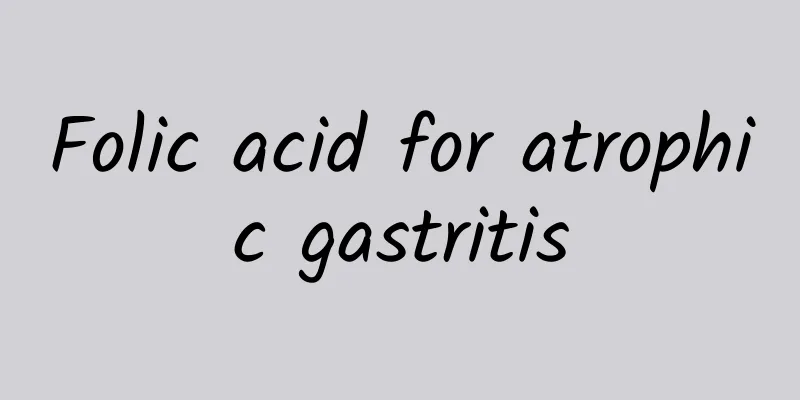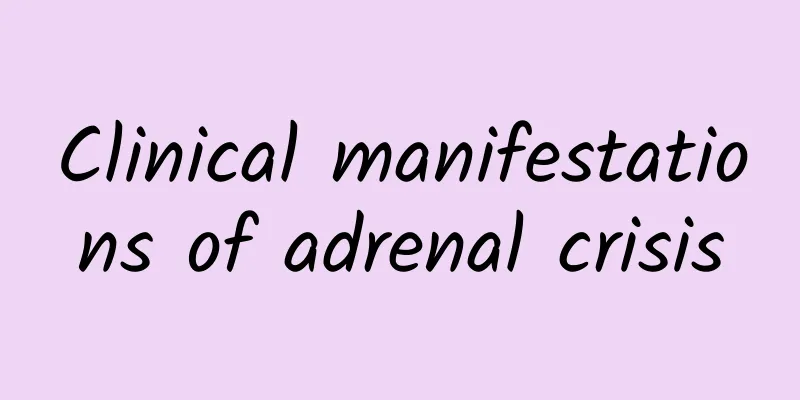Folic acid for atrophic gastritis

|
I believe that many people take folic acid regularly, and they all know that folic acid is more suitable for couples who are preparing to have a baby, because folic acid can reduce fetal malformations, improve the body's disease prevention and genetic transmission. In addition to regulating these, folic acid can also treat gastritis. However, whether folic acid is helpful for atrophic gastritis depends on whether it is effective for the patient after taking it. In addition to taking folic acid, other methods should be combined. 1. What is folic acid? It is a water-soluble B vitamin extracted and purified from spinach leaves by Mitchell (HKMitchell, 1941), so it was named folic acid. Folic acid is a coenzyme required for the synthesis of human nucleic acids. Insufficient folic acid will affect nucleic acid synthesis, normal cell division and replication, and thus lead to various problems in the human body. Studies have confirmed that folic acid promotes the maturation of young cells in the bone marrow. If humans (or other animals) lack folic acid, it can cause megaloblastic anemia and leukocytopenia, and can also lead to physical weakness, irritability, loss of appetite and mental illness symptoms. 2. Can folic acid treat gastritis? Atrophic gastritis is a common chronic gastric disease. The main pathological change is the atrophy of gastric mucosal glands to varying degrees, or their replacement by intestinal mucosal epithelium, which is called intestinal metaplasia. Atrophic gastritis health care. The symptoms of atrophic gastritis vary in severity, but most of them are long-lasting and very annoying. Folic acid is used as a drug for the treatment of atrophic gastritis, but there are many misunderstandings about it. Folic acid intake mostly comes from vegetables and is a type of vitamin, which cannot completely cure atrophic gastritis. 3. Four misunderstandings about folic acid in treating gastritis: Myth 1: Folic acid can be taken for any atrophic gastritis Folic acid has a therapeutic effect on patients with atrophic gastritis and can also be used for those with mild dysplasia. However, patients with moderate dysplasia should be treated with caution and should undergo timely endoscopic and pathological examinations. Once severe dysplasia is found, the mucosal tissue should be removed under gastroscopy or surgical treatment should be performed as soon as possible to avoid further deterioration into gastric cancer. In addition, folic acid is less effective in patients with warty changes (a chronic raised erosive change). Myth 2: Folic acid alone can treat atrophic gastritis Chronic atrophic gastritis is often accompanied by symptoms such as abdominal distension, early satiety, belching, upper abdominal pain or heartburn. Folic acid is obviously not enough to solve these problems, and prokinetic drugs, drugs that inhibit or neutralize gastric acid should be used in combination. When Helicobacter pylori infection occurs, it should be eradicated in a timely manner, which not only helps to relieve symptoms, but also eliminates one of the causes of gastric cancer. In other words, folic acid alone cannot solve the many symptoms of atrophic gastritis. Using folic acid alone in large doses may also lead to vitamin B12 deficiency, so vitamin B12 is usually used in combination with folic acid in clinical practice. Myth 3: Folic acid can be taken in high doses without limit Although folic acid is a water-soluble vitamin with few side effects, its safety in long-term and high-dose use remains to be further observed. For example, it can affect zinc absorption and lead to loss of appetite. Myth 4: Folic acid can "treat" gastric cancer This is absolutely wrong. Folic acid only has a preventive effect on some gastric cancers that develop from atrophic gastritis, but it definitely does not "cure" gastric cancer. Moreover, once the possibility of tumor is found in any organ in the body, whether benign or malignant, folic acid should not be taken because folic acid may promote the growth of tumor cells. Here, the editor reminds you that if you encounter unexplained weight loss, do not take folic acid orally for the treatment of atrophic gastritis unless malignant tumors are ruled out. Be sure to use the medication under the guidance of a doctor. |
<<: Is non-atrophic antral gastritis serious?
>>: Chronic atrophic gastritis grade 1
Recommend
Waking up with pain on the inside of the arch of the foot
People rarely pay attention to diseases of the fe...
What are the reasons for small red spots on the body?
If you want to have a healthy body, you also need...
What is Ovarian Cancer
Female friends must pay attention to their reprod...
What should I do if my left big toe is numb?
In life, our bodies often encounter some minor pr...
How do you know if sperm is normal?
For men, abnormal sperm often leads to infertilit...
The difference between groin eczema and tinea cruris
Inguinal eczema and tinea cruris are both relativ...
Taboos of Dendrobium
Dendrobium is a common Chinese herbal medicine wi...
Can I eat crabs when my aunt comes?
Crab is a must-eat seafood in autumn. Various kin...
What are the dietary prescriptions for the treatment of hernia in Traditional Chinese Medicine?
Hernia refers to a condition in which the content...
Can I only lie down or crawl if I have a lumbar injury?
The lumbar vertebrae of many people are often dam...
Does uterine cyst need treatment?
Most women will feel fear when talking about gyne...
How to treat premature ovarian failure? Chinese medicine strongly recommends six dietary treatments
If a woman begins to experience symptoms such as ...
What should I do if I get bit by mosquitoes in summer?
The most common problem people encounter is being...
What causes tumors on the ears?
If a tumor grows on the ear, you must pay attenti...
Renal tubular disease
Speaking of kidney disease, many friends will thi...









